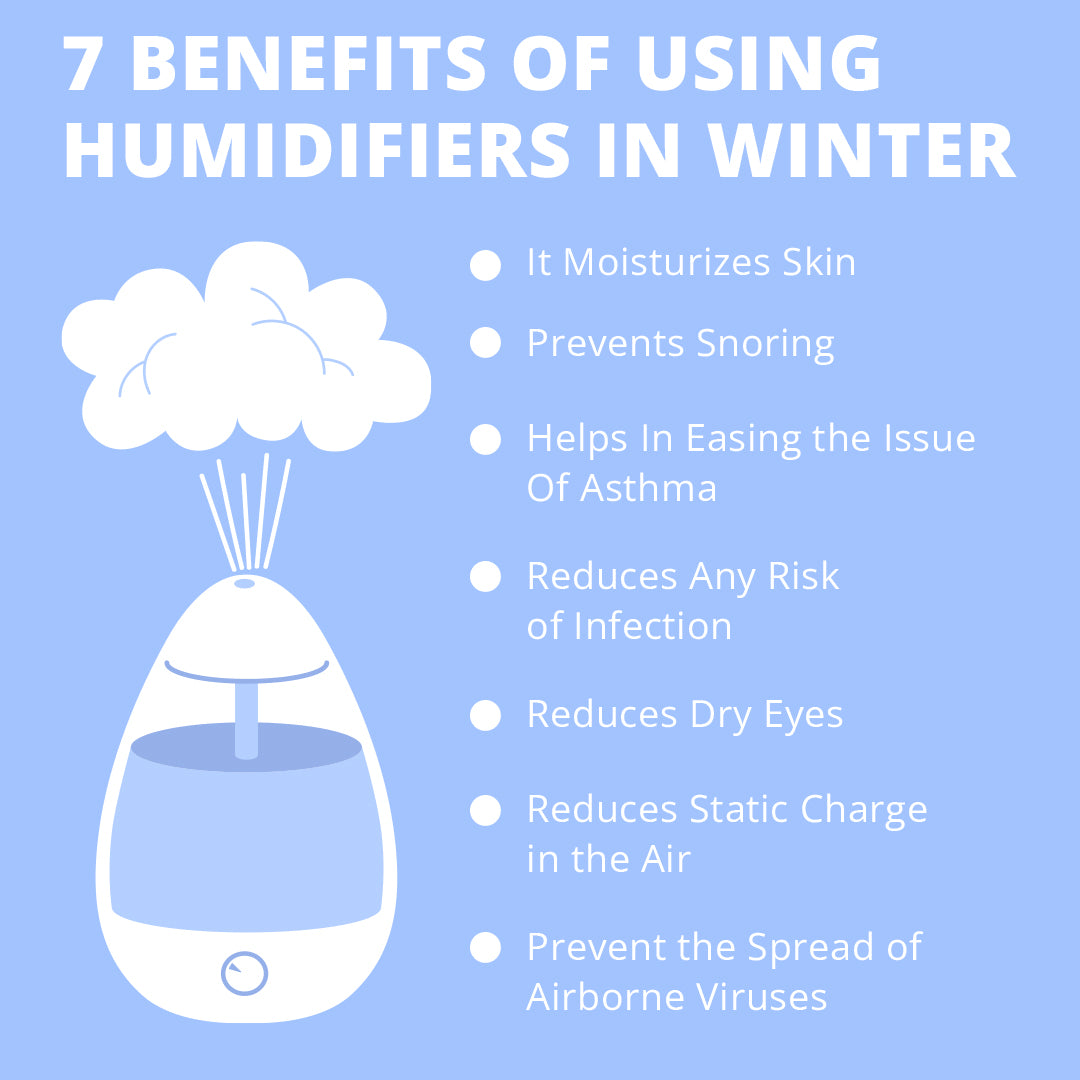Humidifiers are used to increase moisture in the air. Most people use them during the winter when the air is drier because of indoor heating or in climates where the air is naturally dry.
Why Use a Humidifier?
Low humidity levels cause problems like dry skin, dry nasal passages, and irritated eyes. It can also exacerbate respiratory issues, such as asthma and allergies. Adding moisture to the air with a humidifier can help alleviate these symptoms and improve overall comfort.
Some people use humidifiers to alleviate snoring, as the increased moisture in the air can help reduce congestion in the nasal passages. Humidifiers can also help preserve wooden furniture, flooring, and musical instruments, which can be damaged by dry air.
Here’s How A Humidifier Can Help
Humidifiers can help alleviate a range of ailments caused or worsened by dry air, like:
- Dry skin: Low humidity levels can cause dry, itchy skin. Adding moisture to the air with a humidifier can help relieve this symptom.
- Dry nasal passages: Low humidity can dry out the passages, causing discomfort, congestion, and even nosebleeds. A humidifier can help add moisture to the air and soothe nasal passages.
- Respiratory issues: Dry air can irritate the lungs and aggravate respiratory conditions such as asthma, bronchitis, and allergies. A humidifier can help alleviate these symptoms by moistening the air.
- Sore throat: Low humidity can cause a dry, scratchy throat, especially during winter. A humidifier can help add moisture to the air and alleviate this symptom.
- Snoring: Snoring can be caused by congestion in the nasal passages. A humidifier can help add moisture to the air and reduce congestion, which may help alleviate snoring.

Humidifiers for Children or Babies
Humidifiers can be especially beneficial for babies and children, as they can be more susceptible to the effects of dry air. Here are some common reasons why parents may use humidifiers for their children:
- Congestion relief
- Improved sleep
- Skin relief
- Respiratory health
Because of the risk warm-mist humidifiers can cause, it’s best to use a cool-mist humidifier.
How to Use a Humidifier
Humidifiers should be cleaned regularly to avoid the growth of bacteria and other microorganisms.
Over-humidification can also cause problems such as mold growth and the development of dust mites, so it is important to monitor humidity levels and use humidifiers as directed.
Water
The type of water used in a humidifier can affect the performance and lifespan, so it’s better to use distilled or demineralized water to prevent the buildup of mineral deposits or “white dust” that can be released into the air.
Tap water can contain minerals and impurities that can accumulate in the humidifier and cause it to become clogged or damaged over time Also, using tap water can put minerals and bacteria into the air, which can be harmful to breathe in.
Distilled water, free of minerals and impurities, is preferred for most humidifiers. Demineralized water, which has removed most of its minerals, can also be used.
Some humidifier models have specific recommendations for the type of water to use, so it is best to consult the user manual or manufacturer’s instructions for guidance.
Certain types of humidifiers: Warm-mist humidifiers can pose a burn risk, particularly for children, and should be used cautiously. In addition, ultrasonic humidifiers can release a fine mist containing minerals or other contaminants, so it is important to use distilled or demineralized water in these models.
Don’t Use a Humidifier in These Circumstances
- High humidity: If the indoor humidity level is already high, using a humidifier can lead to over-humidification and promote mold growth and dust mite infestations.
- Allergies or asthma: Humidifiers could worsen allergies if not used properly. In particular, warm-mist humidifiers can release minerals and microorganisms into the air that may be harmful to breathe in. Those with allergies or asthma should consult with their doctor before using a humidifier.
- Certain respiratory conditions: Some respiratory conditions, such as cystic fibrosis or chronic obstructive pulmonary disease (COPD), can be worsened by high humidity levels.
Humidifiers can be a useful tool for alleviating a range of symptoms caused by dry air, like dry skin, congestion, dry eyes, and respiratory issues, as well as for babies and children.
Using a humidifier properly and as directed can create a more comfortable and healthy indoor environment for yourself and your family.


